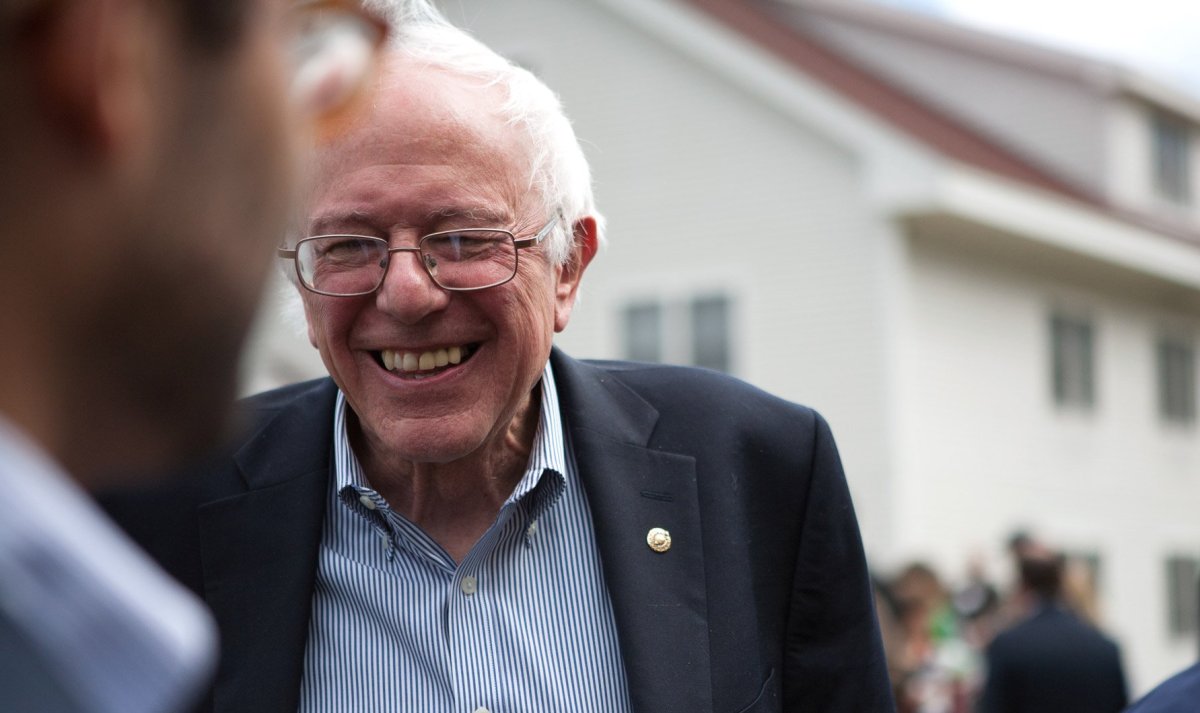By David Sprintzen
Given the completely unpredictable nature of the current political campaign, it is probably somewhat of a fool’s errand to offer the following comments, but I’ll offer them nonetheless. U.S. Sen. Bernie Sanders’ losing four of five Eastern primaries on Tuesday makes it almost certain that former Secretary of State Hillary Clinton will be the Democratic presidential candidate.
Having said that, from the perspective of one who shares practically all of the views expressed by Sen. Sanders (I-VT)—and thus, obviously, would love to see him elected president—I believe his total results are the best that progressives like myself could hope for. Let me briefly suggest why, knowing that there is much more that needs to be said on these matters.
I sincerely doubt that Sanders could have been elected. I know that polls say differently, but I think they completely fail to take into consideration the kind of withering attack that he would face not only from Republicans, but from the mega-rich and the media, both from the mainstream and from the radical right of Talk Radio.
Sanders’ campaign has laid the groundwork for the mobilization of the kind of revolution that he has called for. That is not something that can be done overnight, but will take time and expanded organizing. He has given public “mainstream” political legitimacy to the ideas of Occupy Wall Street—which they were incapable, and even uninterested, in doing. And he has mobilized vast numbers of previously “silent” citizens—particularly Millenials—who can now, hopefully, be brought into the continuing national progressive network of organizations such as MoveOn, US Action, National People’s Action, the Alliance for a Just Society, Citizen Action, the Working Families Party, Planned Parenthood, the Sierra Club, etc. These groups offer the opportunity to move the Democratic Party—and the country—in a far more progressive direction.
Sanders’ campaign has already moved the Democratic Party, and its presumptive nominee, to the left. Clearly, one cannot expect Clinton to stay there without sustained pressure from this newly mobilized left—given her history and the Obama administration’s neo-liberal policies—but the groundwork and mobilization to do that is now possible.
Donald Trump’s garnering the Republican nomination offers both probably the weakest possible opponent to a Democratic victory, and one whom I believe is surprisingly less dangerous than would be a U.S. Sen. Ted Cruz (R-Texas), U.S. Sen. Marco Rubio (R-Fla.), or Gov. John Kasich (R-Ohio) as a nominee. No doubt that last remark calls for an explanation that I cannot provide here. Simply let me assert that, terrible as Trump obviously is, he is less beholden to and captured by the full neo-liberal program of the Republican Establishment than they are.
Thus, the election of New York’s former Democratic U.S. Senator is the more likely scenario. And, with all Clinton’s liabilities (see below), she will be presenting a reasonable corporate liberal agenda, including probably a few new U.S. Supreme Court justices. And hopefully, contributing to the election of a Democratic Senate with an enhanced progressive majority, plus a reasonable increase in Democratic representation in the House.
But the major work will still be to build the national progressive movement state-by-state, while maintaining pressure on a Clinton administration. And if the Republican convention degenerates into a political brawl, so much the better for discrediting the radical right, and weakening its hold on what was once actually a conservative party.
Having said all this, progressives, whatever their proclivities, will have to actively support Clinton’s campaign, whatever their misgivings, while building on Sanders’ momentum. This is certainly not the best of all worlds, but it’s the one we live in, and we must make our choices as effective as possible. There will be only two significant alternatives before us, and no outcome is foreordained, especially in a country in which either party begins any national election probably with more than 40 percent of the electorate committed in advance to vote for their candidate. And the possible election of a Republican is not something to take lightly.
As for the politics of Clinton and President Barack Obama, let me share my personal abridgment of insightful comments by former White House counselor to President Bill Clinton and a two-time Democratic nominee for governor of Connecticut, Bill Curry, in his widely shared March 9 Salon piece “It should be over for Hillary: Party elites and MSNBC can’t prop her up after Bernie’s Michigan miracle,” which he offered immediately after Sanders’ remarkable victory in Michigan. I excerpt them with extensive personal modifications for which he is in no way responsible:
“The fault lines of the new politics are not cultural issues like guns, abortion and same-sex marriage that divide the Democratic and Republican bases. They are issues of political reform and economic justice that divide both parties’ elites from both parties’ bases, and the American people from their government. On these issues we find the elites of both parties shockingly alike. Among them: global trade; financial deregulation and non-prosecution of financial crimes; (attacks on) the social safety net including Social Security, Medicare, a living wage and health care for all; above all, (being quite comfortable with) the ‘soft corruption’ of pay-to-play politics.
“There’s a name for the bipartisan consensus of party elites: neo-liberalism. It is an inconvenient name for many reasons, but mostly because it seems odd that the worldview of the Republican elite would be an ideology with the root word ‘liberal’ in its name but it is true, nonetheless. And may even shed a little light on the open, bitter breach between GOP elites and the party base. Democrats stayed loyal longer to their elites for two reasons. One is their love of two very talented politicians, Bill Clinton and Barack Obama, whose charm and verbal dexterity masked deep differences with the base. The other is their fear of Republicans.
“I often talk to Democrats who don’t know Obama chose not to raise the minimum wage as president even though he had the votes for it; that he was willing to cut Medicare and Social Security and chose not to prosecute Wall Street crimes or pursue ethics reforms in government. They don’t know he dropped the public option or the aid he promised homeowners victimized by mortgage lenders. They don’t know and don’t want to know. Their affection for Bill and Barack—and their fear of Republicans—run too deep.
“Hillary Clinton has neither their deft personal touch nor protean verbal skills. …Voters sense she’s just moving pawns on a chess board in part because she can never explain her change of heart and often doesn’t even try. She switched horses on global trade in a blog post, on the Keystone pipeline at a grammar school event. In a recent debate she left fracking to the GOP governors who covered themselves in glory on Obamacare, as if it were a states’ rights issue. With her Super PAC (and hers and Bill’s breathtaking haul of $153 million in mostly corporate speaking fees), she is the living avatar of pay-to-play politics.
“She remains woefully out of touch with the public mood in other ways.… Clinton has been helped in her quest by her party, by big business, and by top-down endorsements from progressive lobbies many of which broke members’ hearts to deliver them. But no one’s helped her more than the media. I know full well this hasn’t always been true for the Clintons and I also know not all the help is intentional. But the media helps her, primarily by promoting the ‘conventional neo-liberal economic wisdom’ that both she and they share.”
[Read Curry’s complete Salon commentary HERE]
Let me conclude with a few brief comments on neo-liberalism.
Neo-liberalism is clearly a set of policies essentially promoted by the corporate sector, particularly those involved with financial services. It constitutes a systematic attack on the positive role of government in regulating, coordinating and directing economic activity, while seeking to redress the tendency of unregulated capitalism to create vast economic and political inequalities. It promotes unbridled free market capitalism, prioritizing the consumer over the citizen, thus undermining democratic self-government and the collective well being of the people. Its inevitable result, as should finally be quite evident, is extraordinary wealth for the few, and increasing impoverishment for the rest. It must be exposed for what it is, and ultimately defeated.
David Sprintzen is professor emeritus of philosophy at Long Island University and founder and former co-chair of the Long Island Progressive Coalition, where he continues to serve as a member of the board of directors.


































